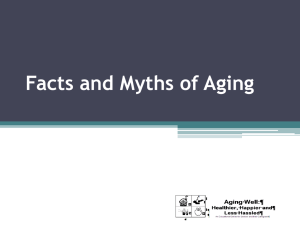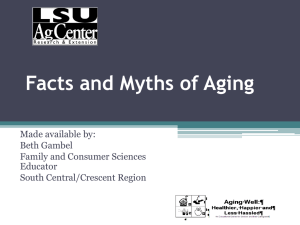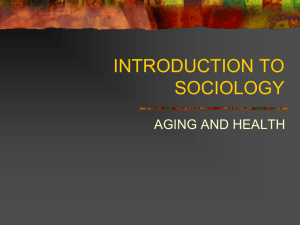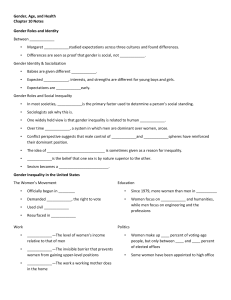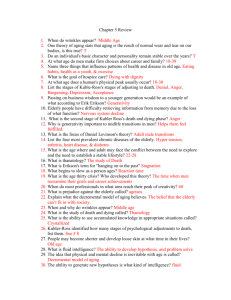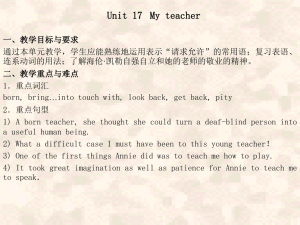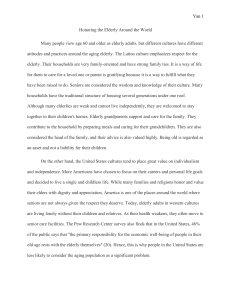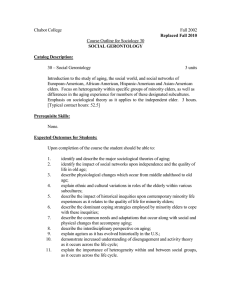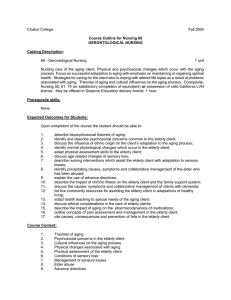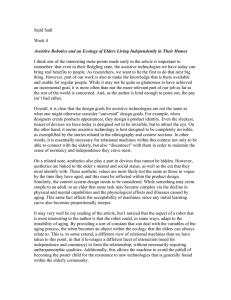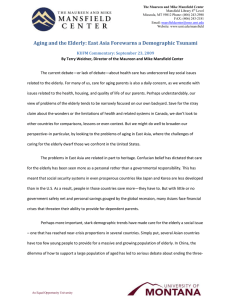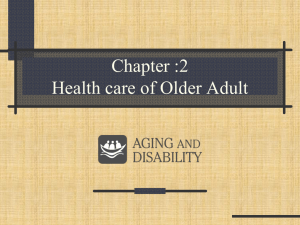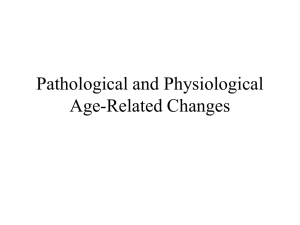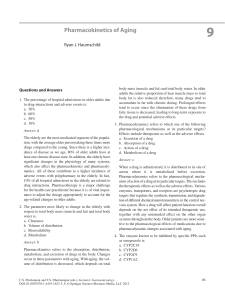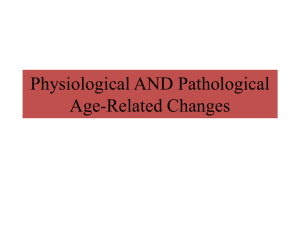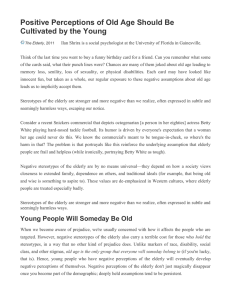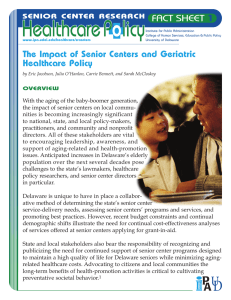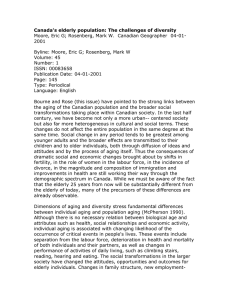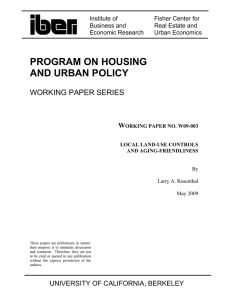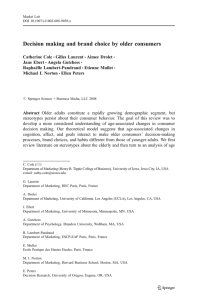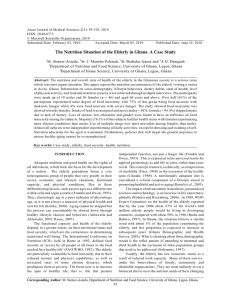Changes, Challenges, and Opportunities in Midlife and Beyond April 10, 2010
advertisement
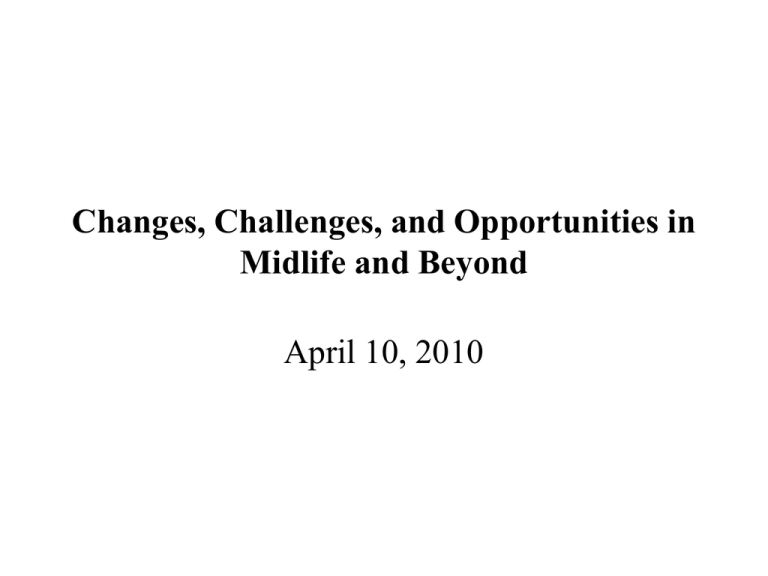
Changes, Challenges, and Opportunities in Midlife and Beyond April 10, 2010 Three Parts: 1. Changes “out there” in our culture 2. Changes in “here,” in body & mind 3. Spirituality – how to meet changes & challenges “well” 1. Changes “out there” The extent and pace of change in modern America are unprecedented and can cause apprehension. Areas of change that touch all of us, but especially aging adults • • • • Technology changes Speed and stimulation Unpredictability in work & finances Changed social behaviors, especially in the young Some examples: • Who would have believed one needed help to use a phone? • ….instructions on how to use a television? • ….applying for Medicare, or Social Security with various complexities…… • For some elderly the wired world holds terror—for some, delight Effect on us, or the consequences of change: • Often a sense of loss, even to the point of fragmentation • Some changes make us different, make us more vulnerable and anxious, disoriented, feeling as if an “outsider.” Different reactions & different styles – • Some embrace – new technologies, email and Facebook • Some withdraw – easy to become a curmudgeon and be critical • Some are mixed – adapt to some changes and withdraw from others Some other examples • Arranging travel online with airline tickets…..making purchases on line, electronic banking….. • We live in a culture where paradoxically nothing vanishes – music catalogues with films etc from 1920s – almost every old TV program and songs from our youth are somehow available…. Daniel Levinson 2. Changes in body & mind A. Physical Changes • Gradual changes in body’s capabilities – • Benchmarks of change tend to be weight, height, strength – • Changes in senses, esp hearing and sight Physical changes, continued • Mysterious aches in the body that weren’t there before • Things simply don’t work as well – digestion, sleeping; recovery from physical effort or normal illnesses or small injuries • Balance • Declines in hormone levels • All the physicians are younger and simply haven’t been inside an aging body “A man/woman your age should expect…..” • More indignities – narcissistic injuries when looking in the mirror Discrimination • We need to be careful not to lapse into mistaken impressions of old age, because of an age-centric perspective in which we view our own age as the most normal of times, the way life should be. • (Story of 100 yr-old man) • Old age is a part of life, another developmental stage: each stage has its own qualities: the art of life Good news • life expectancy going up –along with quality of life. For women, 85, men 80 • the elderly are less involved in accidents • less likely to have infections or digestive problems or allergies because already experienced these earlier in life. But • But new threats like cancer….arthritis… hypertension, dementia • Depression -- because of cumulative losses – especially of status and sources of esteem • Some depression can come from all the drugs we increasingly take—if they are not coordinated properly B. Mental Changes • Mental filters don’t screen out distractions or anxiety as well (in part because of those declines in estrogen and testosterone) • Memory – the need for rituals so we don’t lose stuff, such as keys in the same place. • “What did I come in here for?” Intellectual functioning • No uniform patterns in aging minds – • Some cognitive decline by 67 but then intellectual functioning seems to level off • Clearly it is never too late to learn. Our brains can indeed grow new neurons, new connections. Mental functioning • Fluid intelligence (ability to deal with new problems and situations) –some loss of flexibility here versus • Crystallized intelligence (store information)–– increases here. We know a lot. Think of your grandparents • They were old! But what is old? • I often ask myself: “Did they do this? When did they do it?” • Don’t judge others on the basis of what you think you know –one story of 93-yr-old woman If we are healthy….. • All the pluses of this stage of life – our accumulated wisdom, and we know our life story • If we are fortunate and have sufficient money so as to live comfortably, and if we can do good things for others…. A lot of good news • Researchers find the brain is capable of creating new connections and new neurons all through life… • In spite of some deterioration in working memory and decline in ability to do math problems quickly…. • My experience with poetry: use that memory or lose it. Elderly are interesting • Personalities become more vivid because aging people become more of who they already are….—more outgoing, self-confident and warm with age…..We really have learned a lot about life, people, suffering…. But • The Federal Government, for every $7 spent on the elderly, only spends $1 for children….. • We have received much – how can we be more generative, more attentive to the next generation? 3. Spirituality • Claim – or re-claim -- our religion • I can’t “do” someone else’s religion • We have lived a long time and we know a lot about the demands and complexities of life In order to continue to be vigorous and healthy… • Be engaged with others, socially involved • Be active, mentally and physically • But be careful: a lot of TV watching is not good – too passive and sedentary Change our minds – or ways of thinking about aging… • To a way of viewing late life NOT as a time of decline, • But a time of potential for change, growth, new experiences • An acquaintance told me how much she has expanded and opened up during her 60s and early 70s—unanticipated joys Mixed messages from the culture • Norms and rules are less restrictive –the world of advertising is showing more “grey heads,” but also many youths • The real “enemy” is our own fears, lack of positive images and models, old habits….. • My wife and my pact: no complaining, no being the curmudgeon • Find the positive • No criticizing the next generation – OK, so they do things DIFFERENTLY; it’s not better or worse, just different…. • ….but they live in a different world • Keep my mind open. Adapt. Be flexible. These are signs of health • Try some new things – take risks • Follow one’s curiosity • Find time for quiet and reflection – especially now with a rise in busy-ness and multi-tasking. • What research is finding • Those old clichés are truer than ever: – Live each day – Stay focused on the here and now – Get the most our of each day, each experience • And if we do this-- • We will be ready for death. • We will have lived our life. We will have had a life. • (Most elderly say they are not afraid of death; death-terror seems to be a fear of the young) • Subjective well-being, social relating, meaningful engagement, participating in productive activities – all of this is very helpful for health and longer life • Japanese studies confirm this as Japan is rapidly aging -- about 20% of population over 65 now and 25% in another 5 years….. • Ikigai – a beautify Japanese word trying to summarize a positive sense of self in the world • Mary Oliver – Cape Cod poet asks: “What is it that you plan to do with your one wild and precious life?” • Think about it and • Start now.
